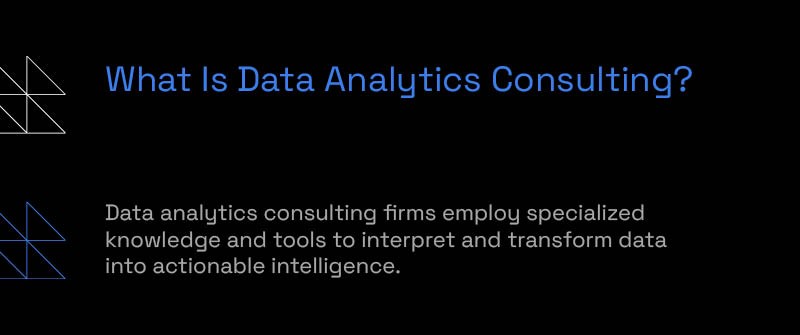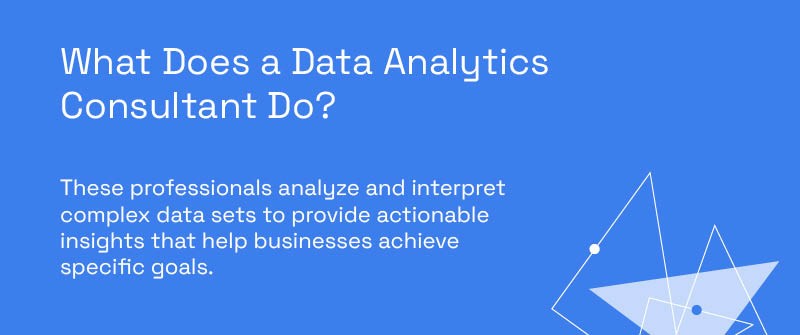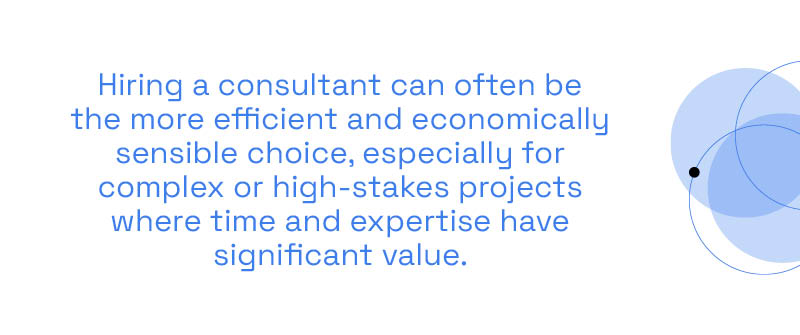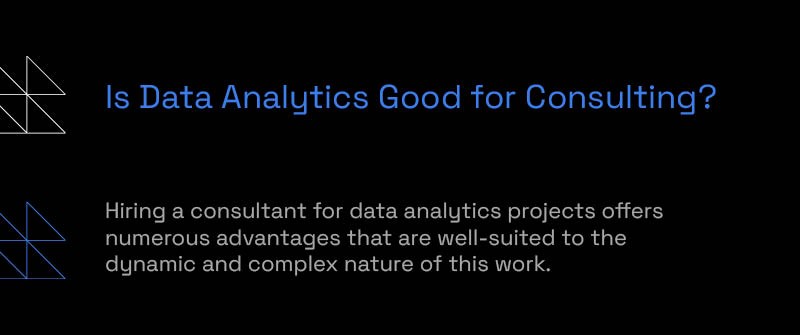
In today’s dynamic business world, the need for data analytics consulting is becoming increasingly crucial. Companies from all sectors are looking to make smarter, data-driven decisions, and they need the right guidance to do so effectively. Data analytics consulting isn’t just about looking at numbers; it’s about transforming these numbers into actionable insights that can improve decision-making, streamline operations, and boost competitiveness. Essentially, data analytics consultants turn complex data into valuable business strategies.
The ability to sift through large amounts of data and pick out meaningful trends is a critical skill in today’s data-rich environment. Data analytics consultants are much more than number crunchers—they are strategic partners who blend their understanding of business and technology to help companies forecast trends, understand customer behavior, and make well-informed decisions.
Navigating the world of data analytics consulting can sometimes be overwhelming with all its specialized terms and concepts. You might wonder what exactly a data analytics consultant does, how they differ from regular data analysts, and whether specific certifications are essential for proving their skills. It’s also important to note that not only big corporations but also small businesses can greatly benefit from using data analytics to enhance their operations and services.
This field also brings up questions about the value of certifications, the roles within data analytics, and the key skills needed to succeed. Understanding these aspects is vital for anyone considering hiring a data analytics consultant or looking to work in this exciting area.
Through this guide, we aim to explore the broad and sometimes complex world of data analytics consulting. Whether you’re a business owner looking to boost your company’s efficiency or someone eager to dive into a career in data analytics consulting, this blog will provide you with the straightforward insights you need to make the most of data analytics. Let’s break down the processes, highlight the benefits, and uncover the essential skills and qualifications needed in the world of data analytics consulting.

What Is Data Analytics Consulting?
Data analytics consulting represents a pivotal service in the modern business world, providing companies with the insights necessary to navigate complex markets and make informed decisions. At its core, data analytics consulting involves the process where top data analytics consulting firms employ specialized knowledge and tools to interpret and transform vast amounts of data into actionable intelligence. This service is crucial for businesses of all sizes, from global corporations to local enterprises, helping them to optimize their operations and drive strategic growth.
The scope of data analytics consulting is broad, encompassing various methodologies and techniques tailored to the specific needs of each business. Whether it’s through predictive analytics, customer segmentation, or performance analysis, data analytics services companies offer the expertise to delve deep into the data and unearth valuable trends and patterns that might otherwise remain hidden. This ability to decode complex data sets is not only beneficial but essential in a competitive business environment where precision and efficiency are paramount.
For small businesses, data analytics consulting can be particularly transformative. The misconception that data analytics is only for large corporations is rapidly being debunked as Microsoft Fabric makes data analytics platforms affordable and accessible to all. These platforms are designed to be scalable, offering smaller enterprises the chance to leverage data-driven strategies that can level the playing field against larger competitors. By capitalizing on tailored data consulting services, small businesses can enhance customer experiences, improve product offerings, and increase operational efficiency—all through the power of data.
The role of the data analytics consultant is central to this process. These professionals combine technical prowess with business acumen, embodying a set of analytics consultant skills that include advanced statistical analysis, machine learning, problem-solving, and effective communication. Their expertise allows them to not only gather and analyze data but also to interpret it in a way that is both accessible and useful for business leaders. This makes the data analytics consultant an invaluable asset for any organization looking to thrive in a data-rich environment.
As we continue to advance into an increasingly data-driven age, the demand for skilled data consultants and robust data analytics consulting services will only grow. Understanding the strategic impact of these services is the first step for any business aiming to harness the true power of their data. In the following sections, we will explore the various facets of the data analytics consulting industry, the skills required to succeed, and how businesses can choose the right data analytics services companies to partner with.

What Is a Data Analytics Consultant?
A data analytics consultant is a specialist who plays a pivotal role in bridging the gap between massive data sets and strategic business decisions. These professionals are equipped with a unique blend of data consultant skills that enable them to extract, analyze, and interpret data to help businesses optimize their processes and make informed decisions. The breadth of their expertise extends beyond mere data manipulation; they are strategic advisors who understand the nuances of business environments and the impact of data-driven decisions.
The consultant’s primary responsibility is to provide insights that are not only relevant but also actionable for the client’s specific business challenges. This involves a deep dive into the client’s data ecosystem to uncover patterns, inefficiencies, and opportunities. Data analytics consultants use a variety of tools and techniques, from statistical analysis to advanced machine learning algorithms, ensuring that they are not only finding answers but also the right questions to ask. Their work often leads to revelations that can redefine a company’s strategy, leading to increased efficiency, reduced costs, and enhanced profitability.
Moreover, the effectiveness of a data analytics consultant is amplified by their soft skills. These include critical thinking, effective communication, and the ability to present complex information in a digestible format for decision-makers. An exceptional analytics consultant does not just provide the numbers; they tell the story behind the numbers, which is crucial for leadership to fully understand the implications of their data.
For businesses, hiring a data analytics consultant is a strategic move towards becoming more data-centric. This decision often stems from the need to improve decision-making processes, adapt to changing market conditions, or simply gain a competitive edge. Data analytics consultants offer tailored advice based on thorough analysis and industry expertise, which is indispensable for businesses aiming to thrive in a data-driven culture.
The growing reliance on data across all sectors has elevated the role of the data analytics consultant to that of a key strategic partner in any business. Whether it’s through ongoing consultancy or specific project-based engagements, these professionals bring a level of expertise and insight that can transform data from a daunting asset into a powerful tool for growth. As we delve deeper into the digital age, the data analytics consultant will continue to be a cornerstone of business strategy, helping companies navigate through the complexities of data with confidence and precision.
Analytics Solutions: What Does a Data Analytics Consultant Do?
The daily responsibilities of a data analytics consultant are diverse and dynamic, reflecting the varied nature of the challenges and opportunities presented by big data. At the core, these professionals analyze and interpret complex data sets to provide actionable insights that help businesses achieve specific goals. Whether it’s enhancing operational efficiency, increasing market share, or driving revenue growth, a data analytics consultant applies a meticulous approach to data to unlock potential and drive business transformation.
A typical day for a data analytics consultant might involve meeting with client stakeholders to understand their business challenges and data goals. This is followed by data collection, cleaning, and analysis using sophisticated software and statistical methods. The consultant then interprets the data, turning complex findings into clear, understandable insights that can inform strategic decisions.
Additionally, data analytics consultants often take on the role of educators and change agents within an organization. They must communicate their findings effectively, not only to C-suite executives but also to teams who will implement their recommendations. This requires a combination of technical data analytics skills and soft skills like communication and persuasion. The ability to articulate the significance of the data and how it relates to business objectives is crucial, as is the consultant’s ability to adapt their messages for different audiences.
Project management is another critical aspect of the role. Data analytics consultants are frequently involved in overseeing projects from inception to completion, ensuring that each phase of the analytics process aligns with the client’s timelines and expectations. This often involves coordinating with other departments, managing resources, and continually assessing project progress against established KPIs.
In sum, the role of a data analytics consultant is integral to modern business practices. Through their expertise in data handling and strategic analysis, they provide essential guidance that helps companies navigate the complexities of the digital age, making informed decisions that propel their businesses forward.

What Is the Difference Between a Data Analyst and an Analytics Consultant?
Understanding the distinction between a data analyst and an analytics consultant is crucial for businesses looking to enhance their data-driven decision-making capabilities. While both roles revolve around data, their scope, responsibilities, and impact within an organization can differ significantly.
A data analyst primarily focuses on the technical aspects of data collection, processing, and routine analysis. They are skilled in using tools and methods to sift through data, identify trends, and generate reports that support operational aspects of a business. Their work is essential for maintaining the integrity and accessibility of data, but it is often more reactive and focused on immediate needs rather than long-term strategic planning.
In contrast, an analytics consultant has a broader, more strategic role. They not only dive deep into data analysis but also interpret the data in the context of larger business objectives. An analytics consultant uses their findings to provide strategic guidance, helping businesses understand complex scenarios and make informed decisions that affect the entire organization. Their work often involves a consultative approach with senior management, where they influence policy and strategy based on data-driven insights.
The key difference lies in the strategic orientation and influence. While data analysts provide the necessary data support and insights for day-to-day operations, analytics consultants leverage data to shape strategic initiatives and drive significant business change. This distinction highlights the more expansive influence of analytics consultants in steering organizational success through data-driven strategies.
What Certifications Are Needed to Be a Data Analyst Working on Data and Analytics Strategy?
Pursuing a career in data analysis often raises questions about the necessary qualifications and certifications that can enhance a professional’s credibility and expertise. While formal education in fields like statistics, computer science, or data science provides a strong foundation, specific certifications can significantly bolster a data analyst’s resume and their ability to perform complex analytical tasks.
One of the most recognized certifications for data analysts is the Certified Analytics Professional (CAP). This certification focuses on end-to-end understanding of the analytics process, from framing business and analytic problems to acquiring data, methodology, model building, deployment, and model lifecycle management. It is designed for those who wish to not only enhance their analytical skills but also showcase their ability to apply these skills in various business scenarios.
Another valuable certification is the Microsoft Certified: Data Analyst Associate, which demonstrates expertise in using Power BI to analyze data from different sources, creating robust data models, and building visualization reports. This certification is particularly useful for analysts who primarily use Microsoft tools and want to exhibit their proficiency in transforming data into actionable insights.
For analysts interested in programming and statistical analysis, the SAS Certified Base Programmer for SAS 9 credential is a practical choice. It covers basic programming skills, managing data, and performing analyses using SAS software, which is widely used in industries like healthcare, business, and research.
These certifications not only validate an analyst’s skills but also signal to employers their commitment to professional growth and excellence in the field of data analysis. As the demand for skilled data professionals continues to grow, these certifications can be pivotal in advancing a career in data analytics.

Is a Data Analytics Certificate Worth It?
The question of whether pursuing a data analytics certificate is worth it comes up frequently. Certifications can play a critical role in the career trajectory of those entering or advancing in this field, providing both foundational knowledge and specialized skills that are highly valued in the marketplace.
For those considering a career in data analytics, a certification can serve as a significant stepping stone. It not only imparts essential technical skills and tools, such as Python, R, SQL, and Power BI but also demonstrates to potential employers a commitment to professional development and a readiness to tackle complex data challenges. Certifications from reputed institutions or recognized bodies can greatly enhance a candidate’s resume, making them more attractive to top data analytics consulting firms and businesses looking for data-driven insights.
Moreover, for professionals already in the field, acquiring a data analytics certification can lead to better job prospects, higher salaries, and more opportunities for career advancement. In industries where analytics are becoming a central element of operations, certification can differentiate you from other professionals and provide the leverage needed to transition into higher roles, such as data analytics consultants or strategic decision-makers.
The return on investment for obtaining a data analytics certificate can be quantified not just in terms of financial gains but also in the broader understanding and capability of handling data-centric tasks. Businesses, especially small businesses, are increasingly recognizing the value brought by skilled data analysts and consultants, enhancing the worth of such certifications.
Investing in a data analytics certificate is generally worth it for those looking to enter or progress in the field of data analytics. The skills, credibility, and opportunities it provides align well with the needs of today’s data-driven businesses, making it an essential credential for aspiring data professionals.
Is a Consultant Higher Than an Analyst?
When deciding between hiring a consultant or bringing on an in-house analyst for data projects, businesses need to consider not only the direct costs associated with each but also the impact on project timelines and overall efficiency. Here’s a closer look at what each option entails financially and operationally:
- Cost of Hiring an Analyst: Analysts are typically employed full-time, which involves not only their salary but also associated costs like benefits, training, and resources needed to perform their job. Additionally, hiring an analyst usually requires an onboarding period. During this time, the analysts must familiarize themselves with the company’s systems and data landscapes, which can introduce downtime and delay project momentum. The ramp-up time needed for analysts to become fully productive can be significant, depending on the complexity of the data systems and the specific business environment.
- Cost of Hiring a Consultant: Consultants, on the other hand, are often seasoned experts hired for specific projects or to address particular challenges. They may come with a higher per-hour or per-project cost, but this is offset by their ability to “hit the ground running.” Our consultants, for instance, come equipped with cross-industry experience and expert-level skills, enabling them to integrate swiftly and effectively with minimal downtime. This rapid deployment can be crucial for projects with tight deadlines or where immediate intervention is necessary.
- Operational and Financial Efficiency: The ability of consultants to start contributing immediately without the need for extended training or ramp-up periods can translate into faster project completion and quicker realization of business benefits. This efficiency not only saves time but can also be cost-effective in scenarios where speed and expertise are critical to the project’s success.
For businesses looking at the bigger picture, hiring a consultant can often be the more efficient and economically sensible choice, especially for complex or high-stakes projects where time and expertise have significant value. While the upfront costs might be higher compared to hiring an analyst, the overall expenditure often balances out due to the consultant’s ability to deliver swift, high-impact outcomes without the lag time associated with training and acclimating new full-time employees. This makes consultants an attractive option for businesses aiming to leverage data analytics effectively and expediently.

Can Small Businesses Use Data Analytics?
Absolutely, small businesses can—and should—use data analytics to drive their decision-making processes and enhance their competitive edge. The misconception that data analytics is only suitable for large corporations with extensive resources is fading as more accessible and affordable solutions emerge. Today, data analytics consulting for small businesses is not just a possibility; it’s a game changer that can level the playing field.
Small businesses typically face unique challenges, such as limited budgets and fewer human resources, which can make the vast potential of data seem overwhelming. However, the advent of cost-effective technologies and specialized data analytics services companies has made it easier for these smaller entities to harness the power of their data. Tools like Power BI or Google Analytics provide user-friendly interfaces and powerful insights that do not require extensive data expertise or resources to manage.
Implementing data analytics allows small businesses to gain a deeper understanding of their customer behaviors, market trends, and operational efficiencies. With these insights, they can make informed decisions that improve customer satisfaction, optimize operations, and increase profitability. For example, a small online retailer can use data analytics to track and analyze customer purchase patterns and feedback, which can inform stock management, promotional strategies, and even customer service enhancements.
Moreover, the strategic use of data analytics can help small businesses anticipate market changes and react more swiftly than competitors, possibly even identifying new market niches before larger companies do. In essence, data analytics equips small business owners with the tools to make smarter, data-driven decisions that are crucial for growth and sustainability in today’s digital economy.
Is Data Analytics Good for Consulting?
Data analytics is a field that particularly benefits from the specialized expertise and flexible approach provided by consulting services. Hiring a consultant for data analytics projects offers numerous advantages that are well-suited to the dynamic and complex nature of this work.
- Expertise on Demand: Data analytics requires a high level of expertise in statistical methods, data manipulation, and interpretation, which can be hard to find and expensive to retain on a full-time basis. Consultants bring this specialized knowledge as needed, allowing businesses to access expert skills without the long-term commitment of hiring a full-time employee. This is particularly valuable for companies that do not require—or cannot afford—a permanent analytics team but still need to leverage advanced analytics to guide decision-making.
- Fresh Perspectives and Innovation: Consultants often work across a variety of industries and bring a wealth of diverse experiences. This exposure allows them to introduce new ideas and innovative solutions that might not be immediately apparent to internal teams. In data analytics, where novel approaches can significantly impact outcomes, the fresh perspectives provided by consultants can be invaluable.
- Scalability and Flexibility: Consulting services are scalable and flexible, adapting to the size and scope of any project. Whether a company needs to analyze large data sets for a one-time project or requires ongoing analysis to monitor key performance indicators, consultants can adjust their level of involvement based on the client’s needs. This flexibility helps businesses manage costs effectively while still capitalizing on high-quality analytics.
- Project-Specific Work: Data analytics projects often have a clear beginning and end, making them ideal for a consultancy model. Consultants can be brought in to handle specific, time-bound projects, deliver results, and then step back once the goals are achieved. This project-based approach is efficient and ensures that businesses pay only for the services they need when they need them.
- Risk Mitigation: Data analytics consultants not only provide insights but also help identify and mitigate risks by forecasting trends and potential problems before they become critical. Their expertise in data security, regulatory compliance, and risk analysis is crucial for companies navigating complex data environments.
Considering these factors, data analytics is an area where consulting can deliver substantial benefits, providing access to specialized skills and flexible, cost-effective services that support strategic decision-making and operational improvements. For businesses looking to leverage data without overextending their resources, consulting services offer a compelling solution.

What Are Good Analytics Consultant Skills?
To excel as an analytics consultant, a combination of technical, analytical, and interpersonal skills is essential. These skills enable consultants to not only handle data effectively but also to communicate their findings in a way that influences strategic decisions and drives business success.
- Technical Skills: At the core, analytics consultants must possess strong data management abilities, including proficiency in data mining, modeling, and statistical analysis. Familiarity with programming languages such as Python or R and tools like SQL for database management is crucial. Additionally, expertise in data visualization tools such as Tableau or Microsoft Power BI is important for translating complex data sets into understandable and actionable visual formats.
- Analytical Skills: Beyond just handling data, good analytics consultants need to think critically and solve problems efficiently. They must be able to identify key insights from large datasets and understand how these insights impact the business. This involves a keen sense of pattern recognition, hypothesis testing, and scenario analysis.
- Business Acumen: Understanding the business context in which the data exists is critical. Analytics consultants should have a solid grasp of the industry they’re working in, including the market dynamics, competitive landscape, and internal business processes. This knowledge allows them to tailor their analytical approaches to the specific needs and challenges of the business.
- Interpersonal Skills: Strong communication skills are indispensable for analytics consultants. They must be able to articulate complex ideas clearly and persuasively to stakeholders at all levels of an organization. This also includes the ability to listen and adapt insights based on feedback and the evolving needs of the business.
- Project Management Skills: Effective project management is key, as analytics consultants often lead projects that require coordinating different teams and managing timelines and resources. They need to keep projects on track and ensure that the analytical solutions provided align with the strategic goals of the organization.
These skills combined make for a competent and effective analytics consultant. Developing and honing these abilities can set a consultant apart in the competitive field of data analytics, enabling them to deliver high-value, impactful solutions to clients.
What to Look for in Data and Analytics Services Companies
When selecting a data analytics services company, businesses should evaluate several key factors to ensure they partner with a firm that can effectively meet their needs and drive meaningful results. Here are the essential aspects to consider:
- Expertise and Experience: Look for companies with a proven track record in data analytics. This includes not only years of experience but also specific expertise relevant to your industry. A company that understands the nuances of your sector can provide more tailored insights and solutions.
- Technological Capability: The right data analytics company should have robust technological resources. This includes access to the latest tools and technologies in data processing, analysis, and visualization. Whether it’s advanced AI capabilities or proficiency with tools like Power BI, the company should demonstrate a strong command of modern data analytics technologies.
- Analytical Methodology: Evaluate the methodologies that the company uses to approach data problems. A good data analytics firm will have a systematic, scientifically sound approach to collecting, analyzing, and interpreting data. They should be transparent about their methodologies and willing to adapt their techniques to align with your specific business objectives.
- Data Security and Compliance: Data security is paramount, especially with increasing concerns around data breaches and compliance regulations. Ensure that the data analytics services company adheres to stringent data security standards and is compliant with relevant regulations, such as GDPR for companies operating in or dealing with the European Union.
- Client Testimonials and Case Studies: Insight into the company’s past projects and client feedback can provide valuable information about their reliability and the quality of their work. Case studies that demonstrate measurable impact and testimonials from past clients can help gauge the company’s ability to deliver practical results.
- Cultural Fit: The partnership with a data analytics firm should be collaborative. It’s important that they understand your company’s culture and work seamlessly with your team. A company that matches your business values and communication style can lead to more effective interactions and successful projects.
By carefully considering these factors, businesses can choose a data analytics services company that not only meets their data needs but also adds strategic value, helping them to leverage data insights for competitive advantage.

Start Transforming Your Analytics Projects Today With Data and Analytics Consulting
If you’re ready to harness the power of data analytics and drive transformative changes within your organization, partnering with a seasoned data analytics services company is your next strategic move. At P3 Adaptive, our consultants possess expert-level skills and extensive cross-industry experience, ensuring that regardless of the complexity or scope of your project, we can deliver high-impact, actionable insights.
We understand that the right data can redefine your business strategy, optimize your operations, and enhance your competitive edge. We are committed to providing tailored solutions that align perfectly with your unique business needs and goals. Our team is equipped with the latest tools and technologies, and we uphold the highest standards of data security and compliance to protect your information.
Let us show you how our data analytics consulting can transform data into your most valuable asset. Work with us and take the first step towards leveraging our comprehensive analytics capabilities for sustainable business growth. Contact us today to get started on transforming your analytics projects with a team that you can trust.
Get in touch with a P3 team member